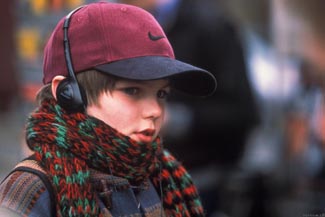
|
Best Use of MusicAbout a Boy
Best use of music in a picture is about as subjective a category as you can get. What makes the music in a film work for one person might mean nothing to another. Though specific soundtracks can make particular movie moments almost immeasurably memorable (John Cusack holding the boom box over his head while "In Your Eyes" plays in Say Anything..., for example), oftentimes it's the underlying score that artfully and subtly determines the mood and tone of a film. Our top ten in the category this year is comprised of an eclectic combination of films that employ these techniques skillfully and memorably. Surprisingly, it's not this year's movie musical that towers over the rest in first place. Instead, About a Boy was the overwhelming favorite amongst our group. Badly Drawn Boy's wonderful soundtrack perfectly captures the spirit of the film, with "Something to Talk About" rising above the the other tunes to carry the theme from beginning to end. Of course, no discussion of the music in About a Boy could be complete without mentioning "Killing Me Softly," which turns up at two very crucial points ("When they sang they closed their eyes."). Add in "Santa's Super Sleigh" and Mystikal's "Shake Ya Ass" for good measure for a sublime combination of musical elements that contribute to the film's overall sweet, buttery goodness. Our voters opted for the combination of jazz and liquor for BOP's second place choice, Chicago. Though a movie version of the Broadway musical would seem to be a natural choice in the category, it's a film that could just as easily have fallen flat on its face if the performers involved hadn't had some degree of talent. The debate continues among our staff members as to whether some of the actors ultimately (hi, Richard Gere!) selected were appropriate for their roles, but there can be no denying that the cynical yet saucy songs that punctuate the film's thematic structure are crucial to the development of plot and atmosphere. The film opens with Catherine Zeta-Jones's performance of "All That Jazz," a never-get-it-out-of-your-head tune that sets the stage for things to come, while numbers like "Funny Honey" and "Cell Block Tango" establish important story elements even as they are wildly entertaining (and hilarious). Possibly the most fascinating aspect of the use of the music in Chicago is how deftly the editing between muscial scene and "plain action" is achieved; what could easily be a series of awkward shifts is handled quite masterfully for a complete experience. Howard Shore's score for The Lord of the Rings: The Two Towers boosts that film to number three on the list. Last year's Academy Award winner for Best Score was able to expand on the musical themes from Fellowship of the Ring as our warriors headed to battle and the hobbits encountered strange and mystical creatures. The music that provides the background for the action is grand and elegant, and highly deserving of notice. Confessions of a Dangerous Mind is a stylish film that requires the music to sync up perfectly to accentuate mood and canny plot elements. Naturally, theme songs from game shows are present in abundance, but even more essential are tunes such as Peter, Paul and Mary's "If I Had a Hammer," The Moonglows' "Sincerely" and Rosemary Clooney's version of "There's No Business Like Show Business." Since the movie spans a few decades, it's important to keep the atmosphere authentic, and Confessions of a Dangerous Mind is always successful at keeping the viewer deeply grounded in the proper setting. Even if you hold Eminem in disdain and have never seen 8 Mile, there's little chance that the soundtrack has been so easy to escape. Standing out over the other selections is, naturally, "Lose Yourself," a song that pretty explicitly elucidates the mood and tension of the film. In a film about a young man struggling to succeed in the music business, it only makes sense that the rap songs and other accompanying tunes would be vital to the success of the picture, and 8 Mile certainly succeeds very strongly on that level. Rounding out the bottom of the top ten are Catch Me If You Can, with another fantastic score from John Williams mixed with an outstanding selection of songs from the era, along with Signs, which has a remarkably memorable James Newton Howard score that is used to great effect during some of the movie's more tense and scary scenes. Undercover Brother makes good use of any number of '70s hits (not to mention "Ebony and Ivory"), while Punch-Drunk Love's sweet strangeness is magnified by its musical accompaniment (including the odd tune "He Needs Me" from Robert Altman's Popeye is a masterstroke). Finally, who can ever forget the insane stylings of one Smoochy the Dinosaur as he warbles "My Stepdad's Not Mean, He's Just Adjusting" to a group of enthralled children? (Kim Hollis/BOP)
|
||||||||||||||||||||||||||||||||||||||||
Tuesday, January 06, 2026
© 2006 Box Office Prophets, a division of One Of Us, Inc.